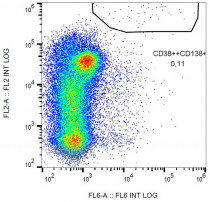ARG65410
anti-CD138 / Syndecan 1 antibody [B-A38] (azide free)
anti-CD138 / Syndecan 1 antibody [B-A38] (azide free) for Flow cytometry,ICC/IF,IHC-Frozen sections,IHC-Formalin-fixed paraffin-embedded sections and Human,Mouse
Cancer antibody; Developmental Biology antibody; Metabolism antibody; Neuroscience antibody; Signaling Transduction antibody
Overview
| Product Description | Azide free Mouse Monoclonal antibody [B-A38] recognizes CD138 / Syndecan 1 |
|---|---|
| Tested Reactivity | Hu, Ms |
| Predict Reactivity | Gpig, Rat |
| Tested Application | FACS, ICC/IF, IHC-Fr, IHC-P |
| Specificity | The antibody BA38 recognizes CD138 (syndecan 1), a heparan sulfate proteoglycan protein expressed mainly in the epidermis and plasma cells, but also in growth factorstimulated lymphocytes. The MWs of the glycosylated CD138 were variety, and MW of the non-glycosylated core protein (dimmer form) was around 60-80 kda. |
| Host | Mouse |
| Clonality | Monoclonal |
| Clone | B-A38 |
| Isotype | IgG1 |
| Target Name | CD138 / Syndecan 1 |
| Antigen Species | Human |
| Immunogen | U266 human peripheral blood myeloma cell line |
| Conjugation | Un-conjugated |
| Alternate Names | CD antigen CD138; syndecan; CD138; SDC; Syndecan-1; SYND1 |
Application Instructions
| Application Suggestion |
|
||||||||||
|---|---|---|---|---|---|---|---|---|---|---|---|
| Application Note | * The dilutions indicate recommended starting dilutions and the optimal dilutions or concentrations should be determined by the scientist. |
Properties
| Form | Liquid |
|---|---|
| Purification | Purification with Protein A. |
| Purification Note | 0.2 µm filter sterilized. |
| Purity | > 95% (by SDS-PAGE) |
| Buffer | PBS (pH 7.4) |
| Concentration | 1 mg/ml |
| Storage Instruction | For continuous use, store undiluted antibody at 2-8°C for up to a week. For long-term storage, aliquot and store at -20°C or below. Storage in frost free freezers is not recommended. Avoid repeated freeze/thaw cycles. Suggest spin the vial prior to opening. The antibody solution should be gently mixed before use. |
| Note | For laboratory research only, not for drug, diagnostic or other use. |
Bioinformation
| Database Links | |
|---|---|
| Gene Symbol | SDC1 |
| Gene Full Name | syndecan 1 |
| Background | CD138 (syndecan 1) is a transmembrane proteoglycan that can bind a variety of cytokines and modulate their activity, as well as the activity of extracellular matrix components and influence many developmental processes. CD138 is expressed mainly in differentiating keratinocytes and is transiently upregulated in all layers of the epidermis upon tissue injury. It is also highly expressed on plasma cells and can be detected even on fibroblasts, vascular smooth muscle cells and endothelial cells. Up-regulation and down-regulation of CD138 on the cell surface often correlates with the gain of cancerous characteristics. Serum levels of the shedded soluble sCD138 are used as a prognostic factor of cancerogenesis. |
| Function | Cell surface proteoglycan that bears both heparan sulfate and chondroitin sulfate and that links the cytoskeleton to the interstitial matrix. [UniProt] |
| Research Area | Cancer antibody; Developmental Biology antibody; Metabolism antibody; Neuroscience antibody; Signaling Transduction antibody |
| Calculated MW | 32 kDa |
| PTM | Shedding is enhanced by a number of factors such as heparanase, thrombin or EGF. Also by stress and wound healing. PMA-mediated shedding is inhibited by TIMP3. |
Images (1) Click the Picture to Zoom In








